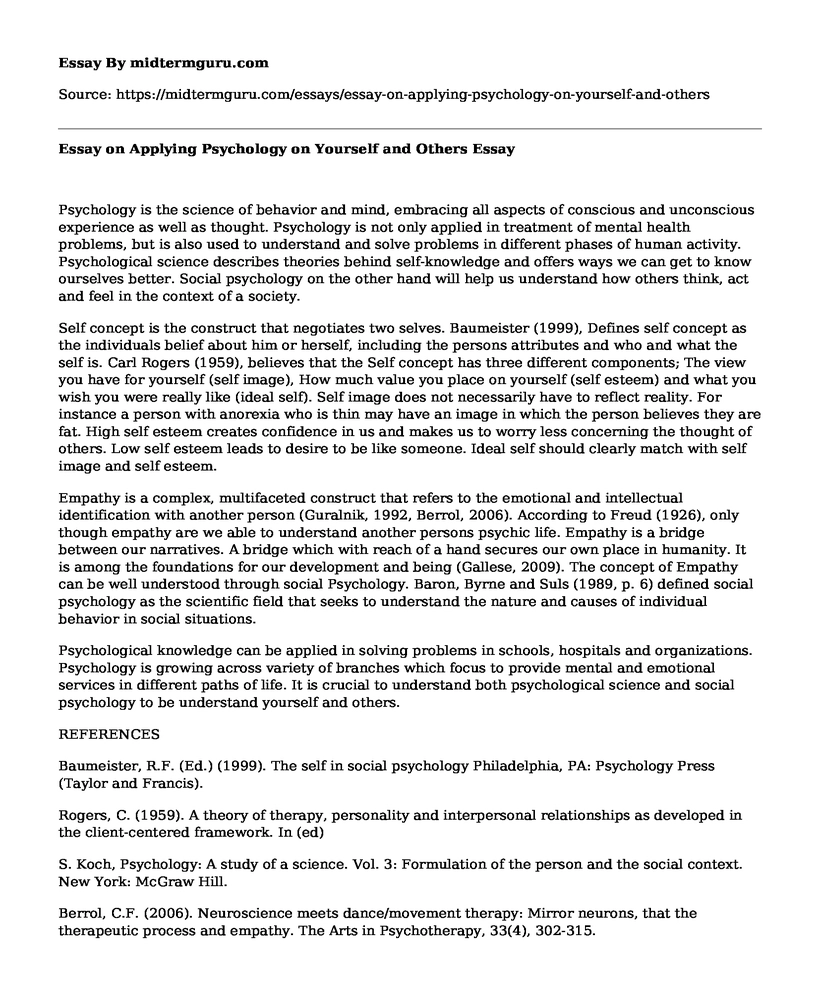Psychology is the science of behavior and mind, embracing all aspects of conscious and unconscious experience as well as thought. Psychology is not only applied in treatment of mental health problems, but is also used to understand and solve problems in different phases of human activity. Psychological science describes theories behind self-knowledge and offers ways we can get to know ourselves better. Social psychology on the other hand will help us understand how others think, act and feel in the context of a society.
Self concept is the construct that negotiates two selves. Baumeister (1999), Defines self concept as the individuals belief about him or herself, including the persons attributes and who and what the self is. Carl Rogers (1959), believes that the Self concept has three different components; The view you have for yourself (self image), How much value you place on yourself (self esteem) and what you wish you were really like (ideal self). Self image does not necessarily have to reflect reality. For instance a person with anorexia who is thin may have an image in which the person believes they are fat. High self esteem creates confidence in us and makes us to worry less concerning the thought of others. Low self esteem leads to desire to be like someone. Ideal self should clearly match with self image and self esteem.
Empathy is a complex, multifaceted construct that refers to the emotional and intellectual identification with another person (Guralnik, 1992, Berrol, 2006). According to Freud (1926), only though empathy are we able to understand another persons psychic life. Empathy is a bridge between our narratives. A bridge which with reach of a hand secures our own place in humanity. It is among the foundations for our development and being (Gallese, 2009). The concept of Empathy can be well understood through social Psychology. Baron, Byrne and Suls (1989, p. 6) defined social psychology as the scientific field that seeks to understand the nature and causes of individual behavior in social situations.
Psychological knowledge can be applied in solving problems in schools, hospitals and organizations. Psychology is growing across variety of branches which focus to provide mental and emotional services in different paths of life. It is crucial to understand both psychological science and social psychology to be understand yourself and others.
REFERENCES
Baumeister, R.F. (Ed.) (1999). The self in social psychology Philadelphia, PA: Psychology Press (Taylor and Francis).
Rogers, C. (1959). A theory of therapy, personality and interpersonal relationships as developed in the client-centered framework. In (ed)
S. Koch, Psychology: A study of a science. Vol. 3: Formulation of the person and the social context. New York: McGraw Hill.
Berrol, C.F. (2006). Neuroscience meets dance/movement therapy: Mirror neurons, that the therapeutic process and empathy. The Arts in Psychotherapy, 33(4), 302-315.
Guralnik, D.B. (1992). (Ed.) Websters new world dictionary of the American language, Warner Brooks, Inc, New York.
Freud, S. (1926). Inhibitions, symptoms and anxiety. Standard Edition, 20, 77-174.
Gallese, V. (2009). Mirror neurons, embodied simulation, and the neural basis of social identification. Psychoanalytic Dialogues, 19(5), 519-536.
Cite this page
Essay on Applying Psychology on Yourself and Others. (2021, Jun 25). Retrieved from https://midtermguru.com/essays/essay-on-applying-psychology-on-yourself-and-others
If you are the original author of this essay and no longer wish to have it published on the midtermguru.com website, please click below to request its removal:
- Feelings of Rejection - Assignment Example
- Paper Example on Strategic Therapy
- Research Paper on Social Media and Mental Health
- Two Theories on Personhood: Ego & Bundle Theory - Essay Sample
- Mental Health: Essential From Childhood to Adulthood - Essay Sample
- Paper Example on Culture-Bound Syndromes: Bipolar Disorder
- Exploring Theoretical and Best Practice Models in Research - Essay Sample







